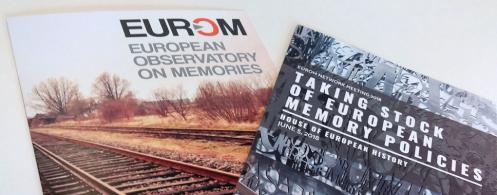
Dear Members of the European Parliament, Jordi, colleagues from EUROM and the European institutions, universities, museums and associations, guests,
Allow me to give you a warm welcome in our house on behalf of the House of European History team. We are very pleased to host this important discussion today.
Those of you who have already visited our permanent exhibition know that we use the concept of memory as the appropriate concept to address issues such as the impact of history on the present, the diversity of memories related to one and the same historical event, memory competition and memory conflicts.
We also examine the various ways of dealing with difficult pasts, between late recognition, silence, distortion of facts, long-time repression, or even punishment of those who want to remember. Memory is therefore, for us, a significant tool to break up a chronological historical narrative made for laymen by a critical reflection on perceptions of the past.
At the same time, we explain the “operating mode” of memory and oblivion with the help of different case studies. We show how both are subjective, how they can change with the context, how they can be manipulated, and how memory can lead to motivate revenge but also reconciliation.
As laid down in our mission statement, we want to serve as a place for debate — raising awareness of different perceptions of shared historical events, and therefore, eventually, to get a mutual better understanding on how to come to grips with the past.
However, is there any chance that such a common approach can be found? Is it even possible to agree on a way of presenting history? During our first year of existence, we have received some comments which, when confronted, are interesting and revealing in this respect.
Let me just quote two rather different views on our exhibition.
In an article entitled “The House of European History and the limits of Memory”(1), one visitor comments (translation by the HEH):
...one leaves (the HEH) with the feeling of having learnt a very rich history lesson, useful for those who want to reactivate their general knowledge about European history (...), but not enough problematized to stimulate critical reflection.
This visitor would have preferred a meta-level of reflection on how the historical narrative was constructed, thus adding more complexity.
On the other hand, one can read in another comment (2):
The European museum is full of negative or problematic histories and their critical reflection — be it colonialism, both world wars, Nazism and Stalinism, limitations to free society, or the contemporary problems of the EU. This culture of negative remembering proved useful to Germany (...). However, there is the question of whether a critical understanding of the past is enough for the creation of identity (...). Thus, the question is whether the European museum should not concentrate more on positive historical models, and especially on European values. This, of course, would be more complicated and would not be possible without heated discussions.”
This visitor would prefer a more affirmative vision in our exhibition. It is interesting to note that he finds it easier to deal with the difficult past than with the positive sides of it; he expects more heated discussions on the values than on dealing with problematic histories.
Does this mean that we have already reached consensus on how to deal with difficult pasts in Europe? Are we ready to agree?
You might have many more ideas on this issue than me, so I will now give the floor to Jordi, whom I thank wholeheartedly for the cooperation on this most interesting event.
I wish you all an inspiring and fruitful debate!
Thank you very much for your attention.